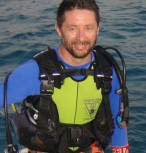DNA reveals the past and future of coral reefs
New DNA techniques are being used to understand how coral reacted to the end of the last ice age in order to better predict how they will cope with current changes to the climate. James Cook Univer

From 2005 to 2022, the main node of the ARC Centre of Excellence for Coral Reef Studies was headquartered at James Cook University in Townsville, Queensland (Australia)








Abstract: This talk will outline the synthesis of biophysical effects of dredging, as a resource for ongoing management, followed by an opportunity for discussion of the implications for developing policy on dredging.
Bio: Laurence McCook works in science-based management of marine ecosystems, especially coral reefs. He has more than 30 years’ experience, including coral reefs in Australia, Indonesia and the “Coral Triangle”, the Pacific and the Caribbean, as well as in temperate ecosystems. For the last 11 years, Laurence worked at the Great Barrier Reef Marine Park Authority, with the aim of ensuring the management of the Great Barrier Reef is based on the best available scientific information, in the face of increasing, cumulative impacts, ecosystem declines and climate change. Laurence led several trans-disciplinary synthesis projects between managers and scientists. Prior to that, he spent 12 years at the Australian Institute of Marine Science, researching the ecology of coral reef resilience and degradation, the effects of water pollution, climate change and over-use. He has a PhD in marine science from Dalhousie University in Canada. In 2005, Laurence was awarded a Pew Fellowship in Marine Conservation. His project focused on management and policy initiatives to protect the resilience coral reefs under climate change, and included developing and delivering a series of workshops on coral reef management across Indonesia, and in Malaysia. He is a Partner Investigator and Adjunct Principal Research Fellow in the ARC Centre of Excellence for Coral Reef Studies.
New DNA techniques are being used to understand how coral reacted to the end of the last ice age in order to better predict how they will cope with current changes to the climate. James Cook Univer
A new study on the effects of climate change in five tropical countries has found fisheries are in more trouble than agriculture, and poor people are in the most danger. Distinguished Profess
James Cook University researchers have found brightly coloured fish are becoming increasingly rare as coral declines, with the phenomenon likely to get worse in the future. Christopher Hemingson, a
Researchers working with stakeholders in the Great Barrier Reef region have come up with ideas on how groups responsible for looking after the reef can operate more effectively when the next bleaching
Abstract: As marine species adapt to climate change, their heat tolerance will likely be under strong selection. Individual variation in heat tolerance and its heritability underpin the potential fo
Abstract: The Reef Ecology Lab in KAUST’s Red Sea Research Center explores many aspects of movement ecology of marine organisms, ranging from adult migrations to intergenerational larval dispersal
Abstract: Macroalgal meadows are a prominent, yet often maligned component of the tropical seascape. Our work at Ningaloo reef in WA demonstrate that canopy forming macroalgae provide habitat for ad
Abstract: Sharks are generally perceived as strong and fearsome animals. With fossils dating back at least 420 million years, sharks are not only majestic top predators but they also outlived dinosa
Abstract: Connectivity plays a vital role in many ecosystems through its effects on fundamental ecological and evolutionary processes. Its consequences for populations and metapopulations have been
Abstract: Evolution of many eukaryotic organisms is affected by interactions with microbes. Microbial symbioses can ultimately reflect host’s diet, habitat range, and even body shape. However, how
Abstract: The past few years have seen unprecedented coral bleaching and mortality on the Great Barrier Reef (GBR) but the consequences of this on biodiversity are not yet known. This talk will expl